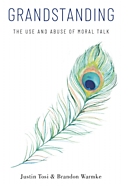We are all guilty of it. We call people terrible names in conversation or online. We vilify those with whom we disagree and make bolder claims than we can defend. We want to be seen as taking the moral high ground not just to make a point, or to move a debate forward, but to look a certain way—incensed, or compassionate, or committed to a cause. We exaggerate. In other words, we grandstand.
Nowhere is this more evident than in public discourse today, and especially as it plays out across the internet. To philosophers Justin Tosi and Brandon Warmke, who have written extensively about moral grandstanding, such one-upmanship is not just annoying, but dangerous. As politics gets more and more polarized, people on both sides of the spectrum move further and further apart when they let grandstanding get in the way of engaging one another. The pollution of our most urgent conversations with self-interested puffery damages the very causes they are meant to advance.
Drawing from work in psychology, economics, and political science, and along with contemporary examples spanning the political spectrum, the authors dive deeply into why and how we grandstand. Using the analytic tools of psychology and moral philosophy, they explain what drives us to behave in this way, and what we stand to lose by taking it too far. Most importantly, they show how, by avoiding grandstanding, we can rebuild a public square worth participating in.
Please join us for a discussion of this important and timely book about political conversation.
Additional Resources

